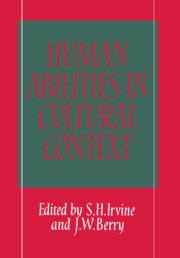Book contents
- Frontmatter
- Contents
- List of contributors
- Preface
- Acknowledgments
- Part I Human abilities in theoretical cultures
- Part II Cultural responses to ability measurement
- Part III Cultural limits upon human assessment
- 15 Native North Americans: Indian and Inuit abilities
- 16 Aboriginal cognition and psychological nescience
- 17 Testing Bushmen in the Central Kalahari
- 18 Caste and cognitive processes
- 19 Educational adaptation and achievement of ethnic minority adolescents in Britain
- 20 The diminishing test performance gap between English speakers and Afrikaans speakers in South Africa
- Author index
- Subject index
18 - Caste and cognitive processes
from Part III - Cultural limits upon human assessment
Published online by Cambridge University Press: 13 January 2010
- Frontmatter
- Contents
- List of contributors
- Preface
- Acknowledgments
- Part I Human abilities in theoretical cultures
- Part II Cultural responses to ability measurement
- Part III Cultural limits upon human assessment
- 15 Native North Americans: Indian and Inuit abilities
- 16 Aboriginal cognition and psychological nescience
- 17 Testing Bushmen in the Central Kalahari
- 18 Caste and cognitive processes
- 19 Educational adaptation and achievement of ethnic minority adolescents in Britain
- 20 The diminishing test performance gap between English speakers and Afrikaans speakers in South Africa
- Author index
- Subject index
Summary
Caste is not a birthmark; it so happens that a Hindu in India is accidentally born into a certain caste. It is not a genetically defined category, such as mental retardation can sometimes be, nor is it as distinct as membership in a specific ethnic group. Caste can best be compared to being in a religious sect, like Protestants and Catholics, whose members may have the same ethnicity. The priests, warriors, merchants, and the service castes share the same genetic pool.
Why do we then search for cognitive markers which would be associated with castes? The best reason a researcher in this field can give is that caste represents a conglomerate of surrogate variables. A search for cognitive competencies among high-versus low-caste groups leads to educational and economic disparities between the two castes which must influence intellectual performance. Caste, like age, can be regarded as an empty variable. The experiential history of low-caste children, in general, is relatively disadvantageous for developing cognitive competence; it is that history of experiences in which we are really interested while comparing low-versus highcaste performance.
How unique are these experiences? What are the major variables which go into this nebulous notion of “experiences”? We suggest that they are the same nonhereditary factors which influence intellectual performance anywhere in the world. The variables, then, are environmental, such as parental expectation regarding the child's educational achievement, the quality of education, and physical factors associated with poverty, such as malnutrition and childhood diseases. If we assume that caste is a salient factor for cognitive competence because it represents these environmental variables, then we have extended the usefulness of studying the relationship between caste and cognition.
- Type
- Chapter
- Information
- Human Abilities in Cultural Context , pp. 487 - 508Publisher: Cambridge University PressPrint publication year: 1988
- 3
- Cited by

